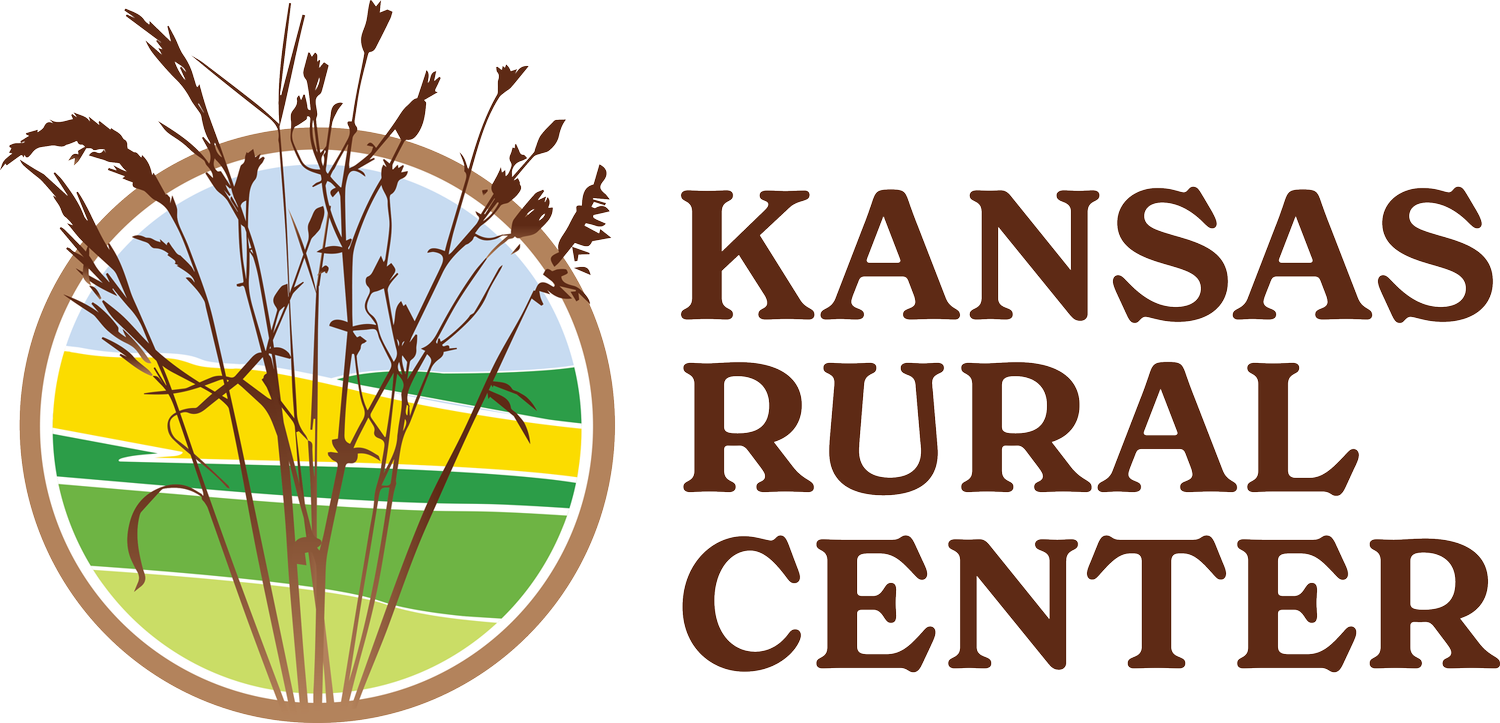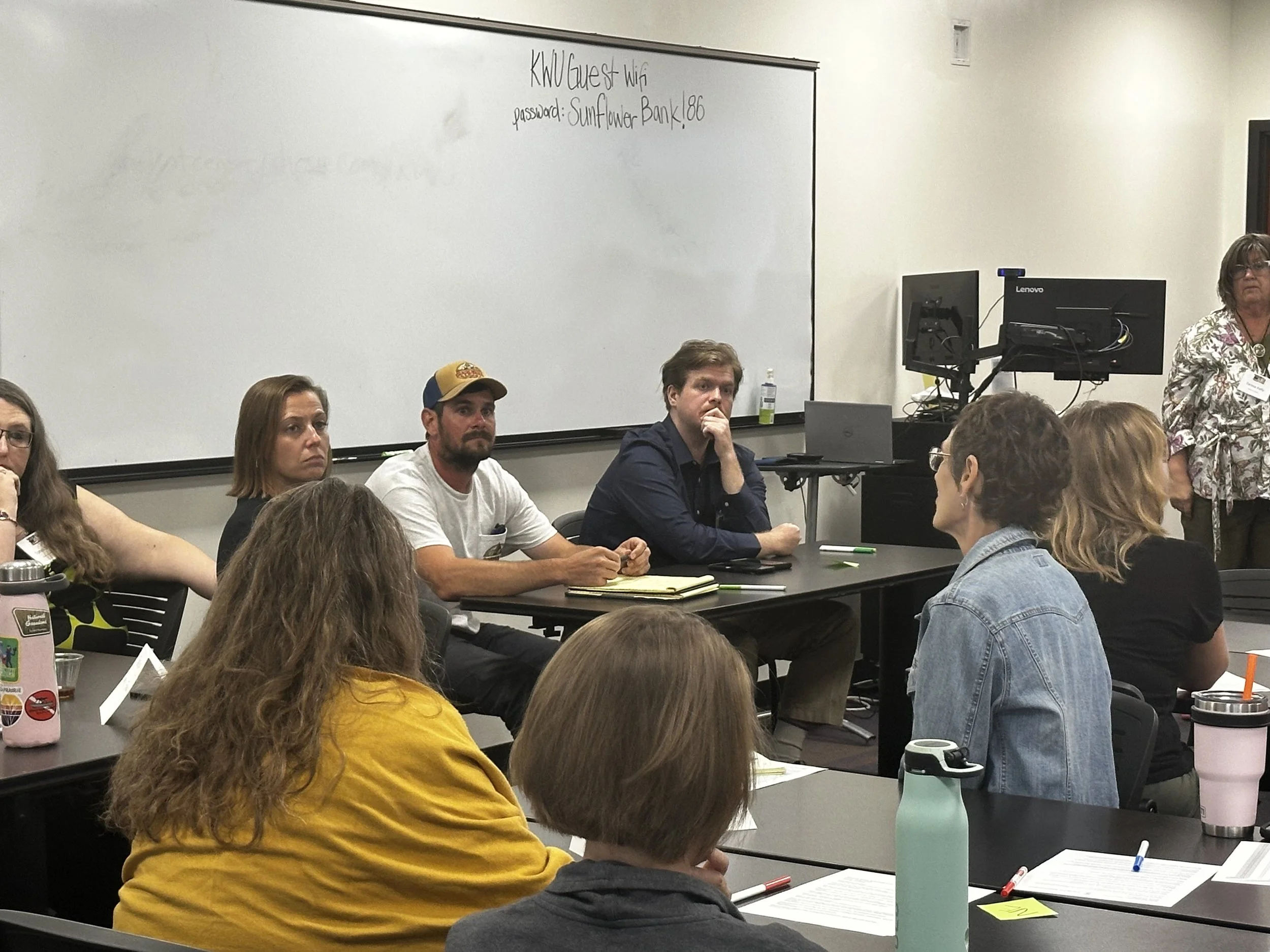Takeaways from Beyond the Scarcity Mindset
At this year’s Local Food Summit at Kansas Wesleyan University in Salina, Kansas, Scott Thelman, owner of Juniper Hill Farms, and Thomas Smith, Executive Director of the Kansas City Food Hub, joined the session “Beyond the Scarcity Mindset, Growing Farmer-to-Farmer Communities to discuss how successful food hub operations work. The session, organized by Teresa Kelly, KRC’s Food Value Chain Coordinator, in an effort to highlight the opportunity that exists to specialty crop farmers and producers through food hubs and considerations needed to make these aggregation services and their partnerships successful.
Thelman and Smith have been successfully championing the work of bringing producers together, strengthening their collective marketing power to compete in larger, more lucrative markets. By pooling product from multiple farms, they can meet the volume and consistency that buyers such as grocery retailers, restaurants, schools and other institutions require. These hubs also provide infrastructure like refrigerated trucks, established routes, and the market demand, while farmers provide the crops allowing small and mid-size farmers to reach markets they couldn’t reach alone, while still maintaining their independence. The result is a stronger regional system that works for both sides.
KC Food Hub
Thomas Smith’s journey started in Boston, where he helped build a network of five food pantries during COVID-19. Relying on national distributors like Feeding America exposed the cracks in the system: truckloads of overripe fruit that went straight to the trash, wasting labor and frustrating volunteers. Smith mentioned that “it really made me question how we’re actually going to solve community health and food access.”
When he moved to Missouri in 2023, Smith joined the Kansas City Food Hub, a farmer-owned cooperative. Today, as director of operations, he helps coordinate a network of about 37 active farms, from organic and conventional producers to Amish, Mennonite, and hydroponic growers.
Making Local an “Easy Choice”
The model is straightforward: farmers list their availability and prices each week through an online marketplace, the hub aggregates the supply, and buyers place orders. Farmers harvest to order and deliver to the hub’s warehouse in Kansas City, where products are organized and sent back out for delivery. For every dollar spent with the hub, 80 cents goes directly to farmers. Not only are the farmers paid a fair wage but the time and expense of marketing their products is taken on by the food hub.
One of the food hub’s proudest achievements has been expanding farm-to-school programs. This fall, 26 school districts across the Kansas City metro and as far west as Topeka will be sourcing fresh produce through the food hub. Smith pointed out one example: Underwood Elementary in Lee’s Summit, which ordered 10 pounds of shiitake mushrooms weekly last fall to use on pizzas. “Those mushrooms were harvested Monday morning, delivered Monday afternoon, and served to kids on Tuesday,” he says. “It doesn’t get fresher than that.”
For Smith, the hub exists to bridge the gap between busy farmers and overworked food service professionals to empower institutions to support these local farmers. “Farmers, school food directors, restaurant owners, they’re all overburdened,” he says. “Our job is to connect the dots, represent the farmer, and make sure good food gets where it’s needed most.”
Juniper Hills
Slightly different than KC Food Hub, Scott Thelman of Juniper Hills also farms and aggregates his own produce in addition to his many partners. Thelman partners with about a dozen other growers across Kansas and Missouri, from half-acre farms to large-scale farmers managing hundreds of acres of produce.
The farm also aggregates regional and national produce such as sweet potatoes from Mississippi and celery from Wisconsin, to keep local customers supplied and maintain those relationships year-round. With three refrigerated trucks and four delivery routes, the farm makes 45–50 weekly deliveries.
Adding Value Through Processing
In 2020, Thelman co-founded Sunflower Provisions, a grocery and processing hub in North Lawrence. Alongside a partner with culinary roots, the business runs a grocery delivery service, a meat counter, and a 1,000-square-foot kitchen. That space transforms surplus produce into soups, sauces, and frozen products, reducing waste while supplying customers through the winter. Other local food entrepreneurs can also rent the kitchen on off-days, ensuring the space pays for itself.
Rooted in Strategy, Growing in Scale
To manage risk, Thelman has organized his farm into multiple LLCs, each covering areas such as trucking, landholding, and other operational components. With land strategically located near the farm in the Kansas River basin, irrigation needs are minimal due to a naturally high water table. Thelman emphasizes the importance of diversification, including commodity crops alongside uninsured specialty crops, to mitigate the financial risk of potential crop failures. By both diversifying production and separating different aspects of his operation into distinct LLCs, Thelman has built a broad safety net—an approach that can serve as a model for other farmers and aggregators looking to grow their operations while managing risk.
By expanding production and connecting with Juniper Hill’s network, farmers can tap into a stable demand that supports their growth. Thelman’s system is designed not only to grow food but also to grow opportunity; for his own family, for partner farms, and for the region’s food system as a whole.
A Network of Food Hubs
These aggregation models are powerful, but it requires consistency. To supply the Food Hubs’ customer base, the partner farmers often need to increase their own production. By scaling up and joining the network, those growers can move beyond the unpredictability of farmers markets or seasonal sales and tap into a more resilient income stream.
Scott Thelman and Tomas Smith answer questions from farmers and organizations on scaling up.
As farmers answer the call to scale, feeding a growing network of food hubs as they are developed across the state, equally important are the aggregators and how they work together. Ensuring that food hubs across the State communicate, work together and avoid institutional infighting will be a key point to their success. A positive example of how this can work is the announcement of KC Food Hub’s involvement in creating a food hub based out of Topeka, KS. During the session Thomas announced that KC Food Hub is joining a smaller local food aggregator, Full Circle Sustainability, to help train and develop a larger infrastructure so that they may then take over and run that food hub independently of KC Food Hub. While more traditional businesses may balk at the thought of creating competition, this style of partnership will only strengthen the security and selling power of local farmers and producers.
Food hubs do more than move products—they strengthen entire communities. By stimulating local economies, expanding access to nutritious food, and weaving together networks of farmers and buyers, they create a resilient system built to last. As food hubs across the state continue to rise and work together they create a “Hub and Spoke” model. Different than the conventional food chain we think of, this model doesn’t fall apart if one link is broken, but continues to be strong through a web of partnerships. At the Kansas Rural Center, we look forward to working with farmers, aggregators, and institutions statewide to help build this durable, interconnected local food system for the health of the land and its people.
Article by Charlotte French-Allen


